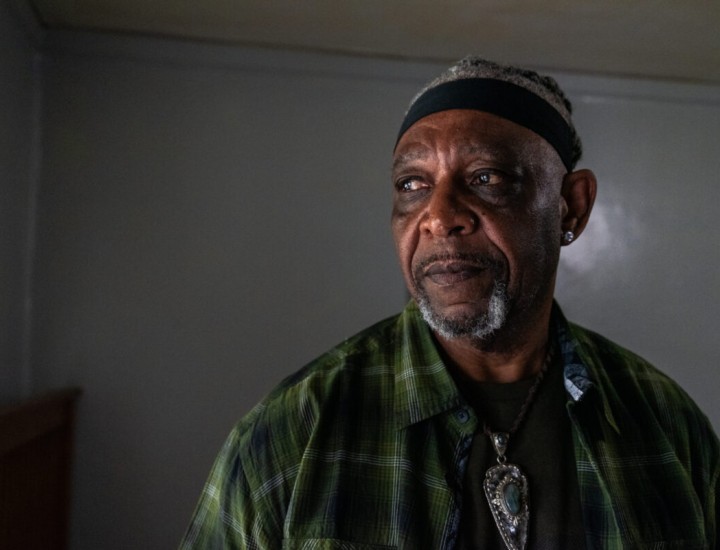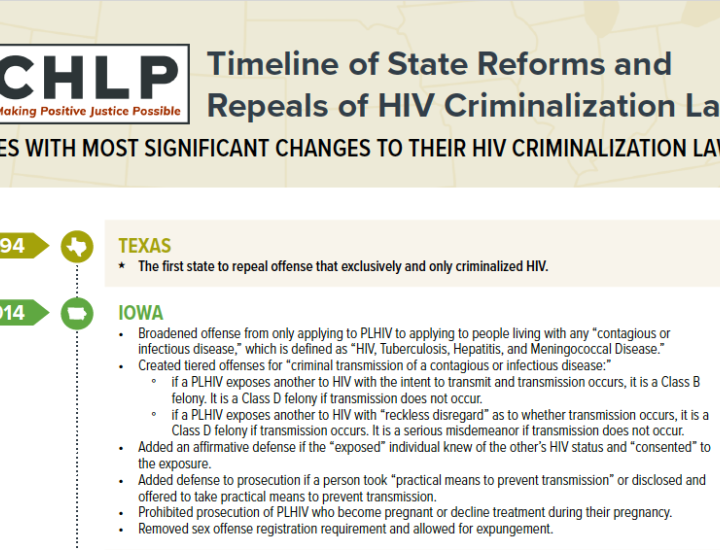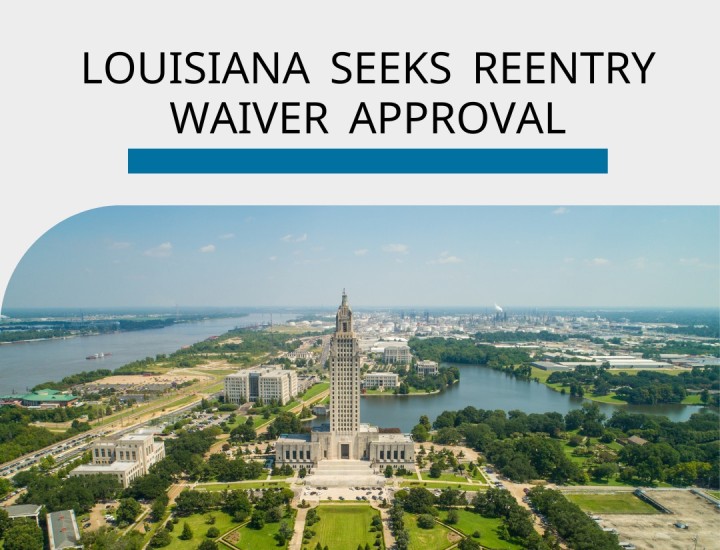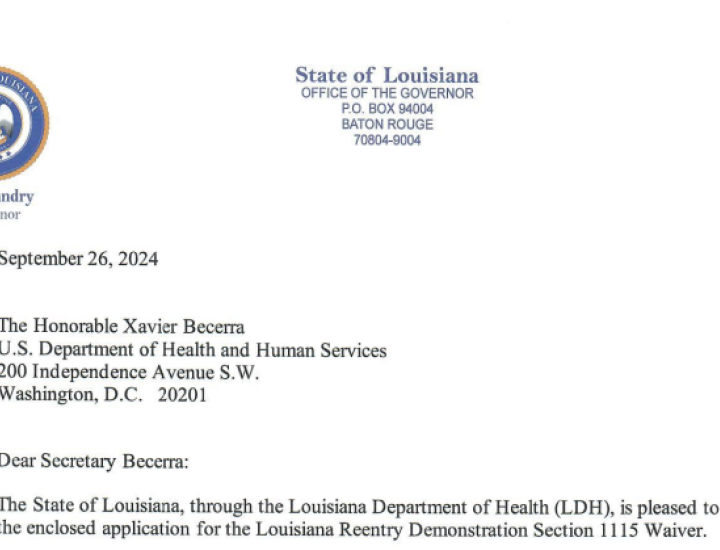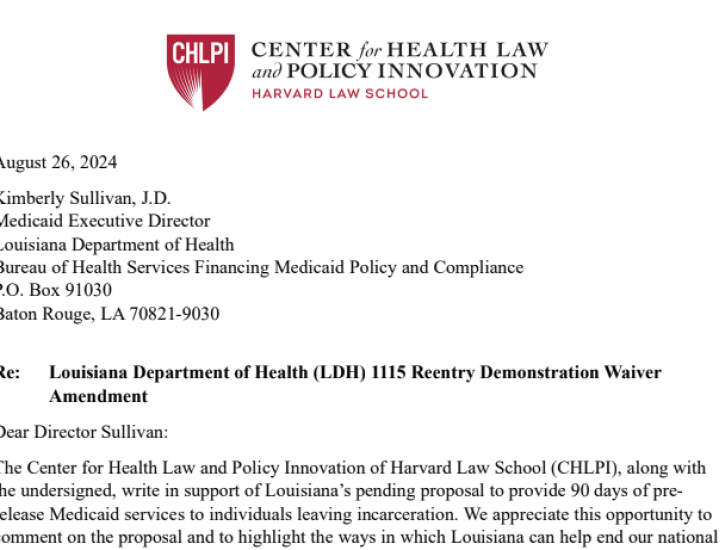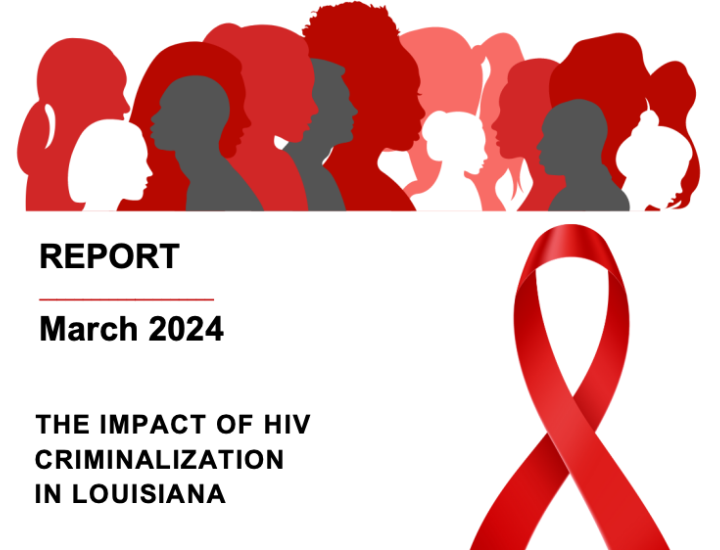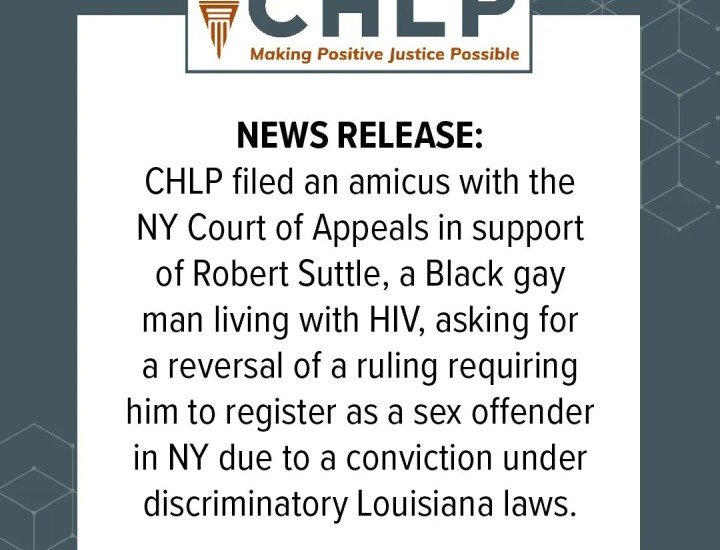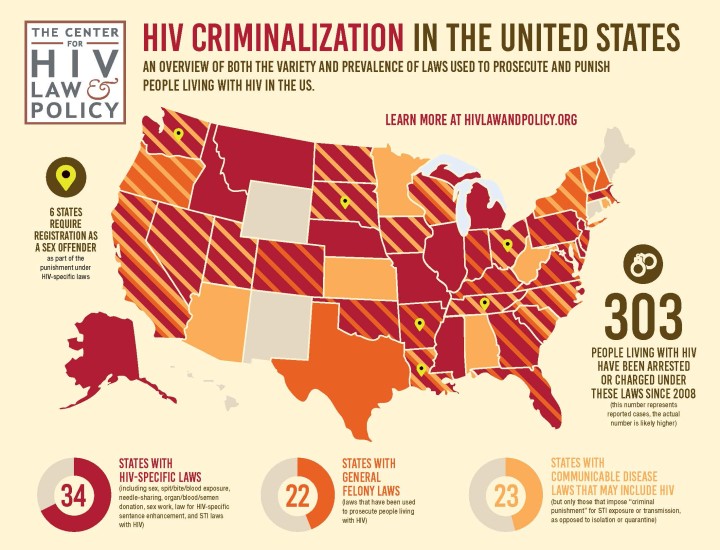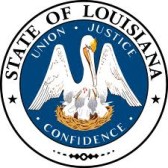
Please note we are in the process of updating this information to reflect the newly revised Mapping HIV Criminalization Laws in the U.S., CHLP (2025). Please refer to that document for the most up-to-date information.
While we have made every effort to ensure that this information is correct and current, the law is regularly changing, and we cannot guarantee the accuracy of the information provided. This information may not be applicable to your specific situation and is not, and should not be relied upon, as a substitute for legal advice.
HIV-Specific Criminal Laws
Louisiana has HIV-specific criminal statutes.
For detail on the selected state law and cases interpreting it, see Louisiana: Analysis & Codes, an excerpt from CHLP’s recently updated compendium of HIV- and STI-related criminal laws and civil laws relating to public health control measures in all 50 states, the military, and U.S. territories. To view the publication in its entirety, see HIV Criminalization in the United States: A Sourcebook on State and Federal HIV Criminal Law and Practice. Methodology is explained in the Introduction (page 5).
It is a felony for PLHIV to intentinally expose another to HIV through sexual contact.
Louisiana has a broad HIV exposure statute that, in addition to targeting sexual exposure, targets exposure "through any means or contact."
A PLHIV that fails to notify a physician or dentist of their status prior to receiving health care servcies may be guilty of a misdemeanor.
Persons convicted under the state's “intentional exposure to AIDS virus” law are required to register as sex offenders.
PLHIV in Louisiana may be prosecuted for HIV exposure under general criminal laws, including for attempted murder.
A PLHIV that fails to notify a physician or dentist of their status prior to receiving health care servcies may be guilty of a misdemeanor.
State Guidelines on Health Care Workers with HIV
We currently are in the process of reviewing and updating our resources and summaries related to health care workers and disclosure. In the meantime, please do not rely on this information as current, and get in touch with CHLP with any questions.
"Health care provider" means a person, partnership, corporation, facility, or institution licensed by the state or federal government to provide health care or professional services as a physician, osteopath, hospital, blood bank or tissue bank and/or an officer, employee, or agent thereof acting in the course and scope of his employment. Practitioner: a physician, podiatrist, physician's assistant, respiratory therapist, or other health care provider licensed or certified by the board and authorized by applicable laws and regulations to perform or participate in invasive procedures or functions ancillary to invasive procedures. Registered Nurse: an individual licensed as a registered nurse in LA, or an individual licensed as a registered nurse in another state and holding a 90-day permit to practice nursing in LA or a nursing student enrolled in a clinical nursing course. Practical Nurse: a licensed practical nurse and/or a practical nursing student/graduate. Dental Health Care Provider: any dentist, dental hygienist, or other personnel working under the supervision of a dentist in a dental health care setting who may perform exposure prone procedures during patient care.
Voluntary testing
For Practitioners, patient must be notified and must give consent. For Registered Nurses, patients shall be notified of the registered nurse's HIV+ status before they undergo exposure prone invasive procedures in which the registered nurse will participate or perform and an informed consent shall be obtained from the patient. For Practical Nurses, patient or patient’s representative must be notified and must give consent.
HIV+ practitioner cannot perform exposure-prone invasive procedures unless each of the following is met: the practitioner has affirmatively advised the patient of the practitioner’s HIV+ status; the patient has been advised of the risk of transmission of HIV during an exposure-prone procedure; the patient has subscribed a written instrument setting forth the exposure-prone procedure, an acknowledgment that the advice has been given and understood and the consent of the patient; and the practitioner's status has been affirmatively disclosed to each practitioner or other health care personnel participating in the exposure- prone procedure. HIV+ Registered Nurses cannot perform exposure prone procedures unless they have sought periodic counsel from an ERP and have been advised under what circumstances they may continue to perform these procedures. HIV+ Practical Nurses cannot participate in exposure-prone invasive procedures unless each of the following is met: the HIV+ status of the practical nurse has been reviewed and the licensee has been approved for practice to include invasive and exposure-prone procedures by the board or the practical nurse has affirmatively advised the patient that the nurse is HIV+ and the patient has been advised of the risks; the patient has subscribed a written instrument setting forth the exposure-prone procedure, an acknowledgement that the advice has been given and understood by the patient; the consent of the patient; and the nurse's status has been affirmatively disclosed to each nurse who may participate or assist in the exposure-prone procedure. Any HIV+ Dental health care provider who may participate in an exposure-prone procedure shall be required to give notice of their status to the board. HIV+ dental health care providers shall not perform exposure-prone procedures unless and until they have provided proper notice, submitted to periodic physical and psychological evaluations by an ERP, and have received authorization to practice and perform procedures—decisions will be made on a case-by-case basis.
Minors' Access to STI and HIV Testing and Treatment
These summaries highlight key aspects of state laws governing the rights of minors to consent to testing and/or treatment for sexually transmitted infections (STIs) and HIV. Any such summary cannot capture the details and nuances of individuals state laws. Although roughly a third of the states permit health care providers to inform a minor's parents that their child is seeking STI-related services, none require it. Also, the law is fluid, and these summaries may not reflect recent legislative change in a particular state.
Every state in the country allows minors to consent to STI testing and care without parental approval, although a number of these set an age threshold for the right to consent without parental involvement. In these states, the minimum age ranges from 12 to 14 years of age.
As of the date of this posting, thirty-one states allow minors to also consent to HIV testing and treatment without parental approval.
HIV Testing
Unlike testing for most other infectious diseases, testing for HIV involves possible benefits as well as social, economic, and legal consequences that typically are not apparent or known to an individual considering testing. HIV-related testing is the gateway to health-preserving treatment; it also can be the basis of criminal prosecution for those who are sexually active, or relied on to exclude individuals who test positive for HIV from programs, employment, or insurance. Although state and federal laws prohibit much of this discrimination against people with HIV, the ability to enforce those rights usually depends on access to free legal services, which are increasingly limited and not available at all in roughly half of the states in the United States. Thus, the potential negative consequences of HIV testing at a particular time or location might inform an individual's decision of whether or when to get tested for HIV; or whether to test anonymously or through a "confidential" testing process that reports their test results and identifying information to the state but maintains the confidentiality of those results.
The American Medical Association has long defined informed consent as a process of communication between a patient and physician that results in the patient's authorization or agreement to undergo a specific medical intervention. Although informed consent is a legal concept rather than a medical one, many states use definitions of "informed consent" for purposes of HIV testing and medical procedures that in fact are inconsistent with the accepted legal definition, e.g., they do not require that an individual receive information or sometimes even notification that they are about to be tested for HIV. The Center for HIV Law and Policy (CHLP) accepts the legal and court-affirmed definition of informed consent; therefore, state protocols that call for "opt-out" testing (a patient is tested for HIV unless she/he objects) or that mirror general consent approaches are not counted as "informed consent" laws even in those instances where the state legislature has characterized their state law as requiring "informed consent." In short, CHLP does not consider or count laws that allow a patient's silence or general consent as granting authority to do confidential HIV testing as informed consent laws.
Find the laws in a different state.
Copyright Information: CHLP encourages the broad use and sharing of resources. Please credit CHLP when using these materials or their content. and do not alter, adapt or present as your work without prior permission from CHLP.
Legal Disclaimer: CHLP makes an effort to ensure legal information is correct and current, but the law is regularly changing, and the accuracy of the information provided cannot be guaranteed. The legal information in a given resource may not be applicable to all situations and is not—and should not be relied upon—as a substitute for legal advice.
